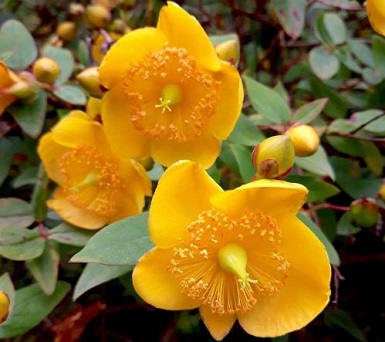Herbs And Phytochemicals - Xanthones from Hypericum beanii exhibit potent anti-inflammatory properties
Nikhil Prasad Fact checked by:Thailand Medical News Team Aug 07, 2024 1 year, 5 months, 3 weeks, 3 days, 4 hours, 27 minutes ago
Herbs And Phytochemicals: In a groundbreaking study, researchers from Anhui Medical University in China have unveiled the significant anti-inflammatory effects of compounds found in the herb Hypericum beanii. This
Herbs And Phytochemicals news report delves into the exciting discovery and its implications for treating inflammation-related conditions.
 Herbs And Phytochemicals - Xanthones from Hypericum beanii exhibit
Herbs And Phytochemicals - Xanthones from Hypericum beanii exhibit
potent anti-inflammatory properties
The Healing Power of Hypericum beanii
Hypericum beanii, commonly known as "Huang-hua-xiang," is a perennial herb that thrives in temperate regions like Yunnan Province, China. Traditionally, it has been used to treat various ailments, including menstrual fever, jaundice, upper respiratory infections, and hepatitis. Recent research has highlighted its potential in modern medicine, particularly for its anti-inflammatory properties.
Discovery of Xanthones
The study, led by Wei Ma, Fu-Cai Ren, Xue-Ru Wang, and Ning Li from the School of Pharmacy at Anhui Medical University, isolated twenty-four xanthone compounds from Hypericum beanii. Among these, one new xanthone (3,7-dihydroxy-1,6-dimethoxyxanthone) and twenty-three known ones were identified. Xanthones are bioactive compounds known for their diverse pharmacological activities, including anti-inflammatory effects.
Testing the Anti-Inflammatory Effects
The researchers tested the anti-inflammatory properties of these xanthones by measuring their ability to inhibit nitric oxide (NO) production in LPS-stimulated RAW 264.7 macrophages, a type of immune cell. Compounds 3,4-dihydroxy-2-methoxyxanthone (15), 1,3,5,6-tetrahydroxyxanthone (19), and 1,3,6,7-tetrahydroxyxanthone (22) demonstrated significant anti-inflammatory effects at a concentration of 10 µM, outperforming the positive control, quercetin.
How Xanthones Work
The study findings reveal that the potent xanthones reduced the expression of key pro-inflammatory markers, including inducible nitric oxide synthase (iNOS), tumor necrosis factor-alpha (TNF-α), interleukin-1 beta (IL-1β), IL-6, and cyclooxygenase-2 (COX-2). By inhibiting these molecules at the transcriptional level, the xanthones effectively diminished the inflammatory response.
Detailed Findings
-NO Production Inhibition: Compounds 15, 19, and 22 significantly reduced NO production in LPS-stimulated macrophages. NO, regulated by iNOS, plays a crucial role in promoting inflammation. By suppressing iNOS expression, these xanthones reduced NO levels, indicating their strong anti-inflammatory potential.
-Cytokine Suppression: The study found that these compounds also decreased the levels of TNF-α, IL-1β, and IL-6, which are key cytokines involved in the inflammatory response. High levels of these cy
tokines can lead to exaggerated immune responses and chronic inflammatory diseases.
-COX-2 Expression Reduction: Additionally, compounds 15, 19, and 22 lowered the mRNA expression of COX-2, an enzyme involved in the inflammatory process. Elevated COX-2 levels are associated with inflammatory pain, and its inhibition is a target for many anti-inflammatory drugs.
Molecular Analysis
The research included a thorough analysis of the molecular structures of the xanthones. It was observed that the number and position of hydroxyl (-OH) and methoxy (-OCH3) groups significantly influenced their anti-inflammatory activity. For instance, substituting -OH with -OCH3 at specific positions reduced the compounds' effectiveness.
Implications for Medicine
The findings suggest that xanthones from Hypericum beanii could be developed into effective anti-inflammatory agents. Given their ability to modulate key inflammatory pathways, these compounds offer a promising natural alternative to synthetic anti-inflammatory drugs, potentially with fewer side effects.
Conclusion
The discovery of these potent anti-inflammatory xanthones from Hypericum beanii opens new avenues for natural treatments of inflammation-related diseases. The study underscores the importance of traditional medicinal plants in modern drug discovery and highlights the potential of xanthones as therapeutic agents.
The study findings were published in the peer-reviewed journal: Molecules.
https://www.mdpi.com/1420-3049/29/15/3705
For the latest on
Herbs and Phytochemicals, keep on logging to Thailand Medical News.
Read Also:
https://www.thailandmedical.news/news/citrus-pomace-shows-promise-in-combating-intestinal-inflammation
https://www.thailandmedical.news/news/taiwanese-study-finds-that-dihydrophenanthropyrans-from-pholidota-chinensis-alleviates-neutrophilic-inflammation-by-inhibiting-mapks
